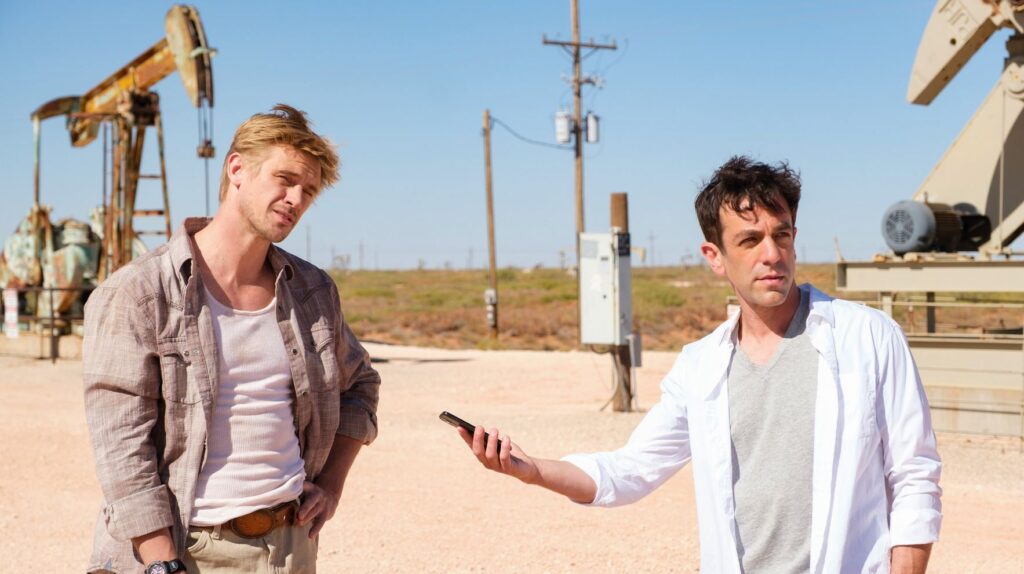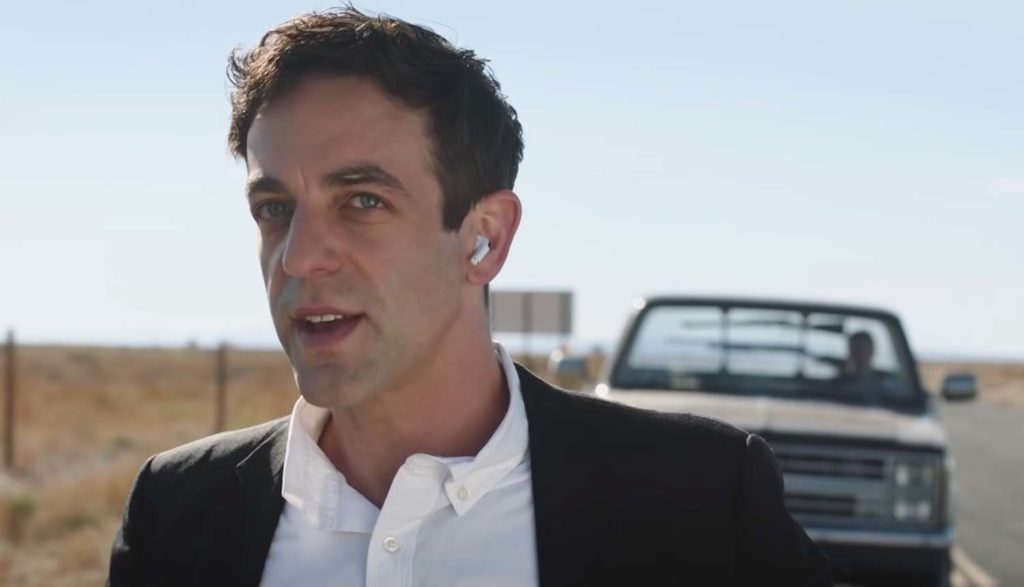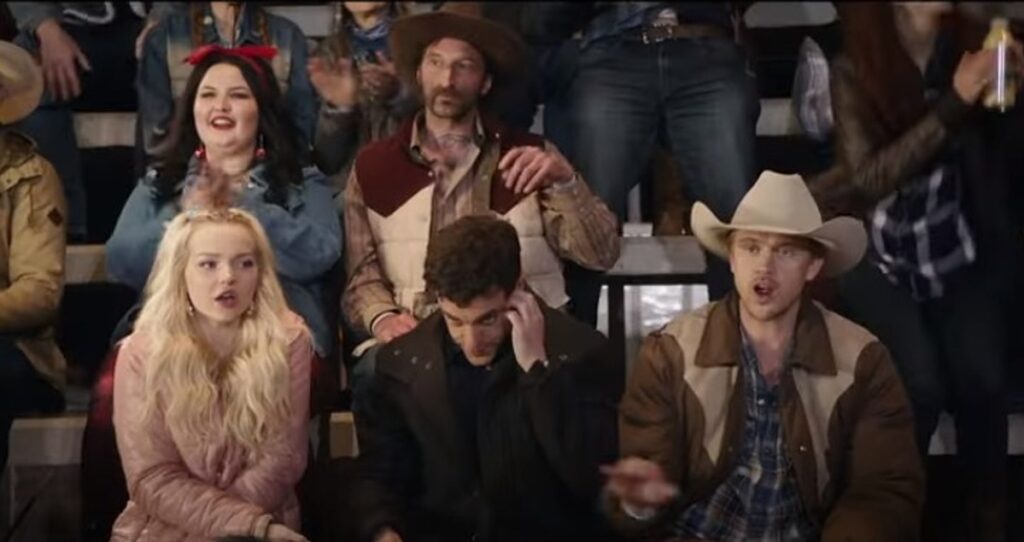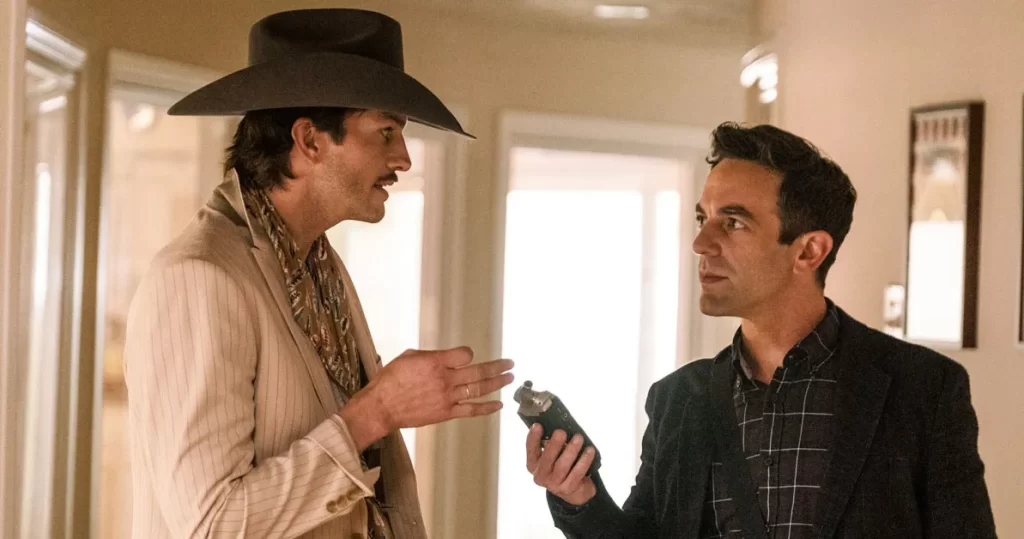
When the American version of The Office began, it presented B.J. Novak’s character Ryan as a thoroughly normal guy who happened to wander into a horribly dysfunctional workplace. (In the very first episode, he sits by helplessly as Michael plays a pointlessly cruel prank on Pam.) If he could at times appear above it all, that was simply a matter of relativity; he was superior by virtue of being average. Yet as the series progressed and the characters gained dimension, Ryan’s bemusement curdled into smugness, and Novak gradually revealed the character’s face—generically handsome, with darting blue eyes and topped by wig-worthy hair—to be a mask that camouflaged his selfishness and cruelty. If Michael Scott was the terrible boss who secretly had a heart of gold, Ryan Howard was the reverse—a superficially nice guy who was actually a complete jerk.
Vengeance, Novak’s first feature as writer-director, interrogates that same arrogance with a curious mixture of irony and sincerity. He casts himself as Ben Manalowitz, a smarmy and vapid New York writer who’s quick to tell you that he “went to school in Boston.” Ben has aspirations of breaking into the podcast scene, but when we first meet him on the terrace of a poshly appointed loft, he’s more preoccupied with defending his singlehood, pontificating with a friend (played by John Mayer?!) about how their rigorous lack of commitment is really an advanced form of human evolution. Later that evening, he reconnects with a past hookup whom he’s stored in his phone as, “Random House Party”; when she enters his apartment, he asks her (to her bafflement), “How’s the book business?” Real prince.

The exaggerated coastal-elite pretension of these early scenes—which also feature Ben pitching an editor (Issa Rae) on a vague podcast, one that’s “about America, but not in a Lana Del Rey way”—lies in stark juxtaposition to the movie’s cold open, which occurs at dusk in a Texas field. (Shooting took place in New Mexico.) As an oil rig oscillates in the distance and Toby Keith’s “Red Solo Cup” clangs on the soundtrack, we gain a glimpse of someone crawling through the dirt; they’re illuminated only by the light of their cell phone, which quickly and ominously blinks out into darkness. That eerie image, combined with the on-screen appearance of the blunt title, would seem to portend the unspooling of a grim and gritty crime fable in the vein of the Coen Brothers’ Blood Simple.
Vengeance, then, is a film that attempts to operate on multiple levels at once: as a suspenseful murder mystery; as a smirking fish-out-of-water comedy; as a ruminative study of geographical and political differences. That it manages to balance these seemingly disparate tones and genres with a measure of dexterity—that it succeeds more often than it fails—is a testament to the intelligence of Novak’s screenplay, and to his willingness to make fun of himself even as he pursues a seemingly earnest line of dialectical inquiry.

The jumping-off point, for both Ben’s professional flight and the movie’s broader story, is a wonderfully silly contrivance. A young woman whom Ben casually slept with has been found dead in West Texas (“Abilene is three hours from Dallas, and we’re five hours from Abilene”), and her family is under the mistaken impression that he was her devoted boyfriend rather than a random fling. After they cajole him into attending her funeral, they inform him of their suspicions that the deceased didn’t die of a drug overdose as the police claim; rather, she was murdered, and her death is part of a nefarious conspiracy that has ensnared their charming little slice of Americana. Eyeing these apparent rubes the way a vulture circles carrion, Ben resolves to interview them—ostensibly to further explore their theory, but really to expose their ignorance and to shed light on the delusions that have afflicted the masses of U.S. citizens who don’t live in blue-state cities. (As he frames it to his editor, “It’s the holy grail of podcasts: Dead White Girl.”)
What follows is largely predictable and pleasurable. Rather than lay bare his targets’ collective stupidity, Ben discovers that they’re far more worldly (and well-read) than he had anticipated. Some of these revelations, such as a drug dealer’s secret admiration for Adele, can feel overly glib, but for the most part Novak conveys his character’s dawning awareness with variety and wit. For example, when Ben pompously starts explaining the law of Chekhov’s Gun to an interviewee (Isabella Amara), she responds by rattling off several of the artist’s plays that don’t feature any guns whatsoever, forcing him to admit that he’s never actually read the playwright’s work. Earlier, a grandmother (Louanne Stephens) surprises him with her knowledge of Austin’s SXSW festival. By the time a rodeo emcee dubs him a condescending asshole (thereby speaking for everyone in the audience), Ben’s lazy assumptions of redneck life have been thoroughly shattered.

Well, kind of. Novak is canny enough to prevent Ben from wholly relinquishing his long-nourished sense of superiority, which emerges in ways both minor (he’s constantly correcting people that he writes for The New Yorker rather than New York Magazine, and he winces when his blasé refrain of “hundred percent” is given undue weight) and meaningful. As he learns more about Texan customs and vernacular—such as how the phrase “Bless your heart” can function as either a sincere statement of gratitude or a judgmental expression of pity—he retains a certain skepticism, and he vacillates between mounting self-loathing and more conventional haughtiness. For their part, his subjects—whose casting represents a who’s-who of contemporary television, including the cop from Narcos (Boyd Holbrook), the lawyer from Succession (J. Smith-Cameron), and the sexpot from Schmigadoon! (Dove Cameron)—don’t entirely evade the region’s stereotypes; they love oil, guns, and Whataburger, and they seem fanatically loyal to their homeland despite its hostile qualities. (When someone vows that he’ll never leave such a vicious and forsaken wasteland, Ben acknowledges that he feels the same way about Twitter.)
For much of Vengeance, this process of philosophical give-and-take—of illumination and regression—is promisingly messy. That sense of potential multiplies upon the introduction of Quentin (Ashton Kutcher), a music producer who enters with a show-stopping monologue equating a banal pop melody to the very first sound heard in the history of the universe. Like everything else in the film, the conversations between Ben and Quentin carry a whiff of didacticism, but they’re engagingly constructed (Quentin refers to Ben as “a playlist guy”), and they deepen the movie’s sense of intrigue.

Yet as Vengeance progresses, it really regresses, foregrounding its didactic mystery subplot and sacrificing its intellectual complexity. Having broached several explosive topics—the polarization of American politics, the rise of QAnon and the alt-right, the internet’s ruthless commodification of suffering—Novak fails to tie them into a cogent thesis. And because he lacks the filmmaking chops to execute the noirish elements with any panache—that opening shot of a dimming cell phone is the only moment that could possibly pass as a visual flourish—the emptiness of his rhetoric grows more pronounced, especially during a ludicrous ending that betrays the preceding thoughtfulness and honesty of the characterizations.
Perhaps the idea here is that we’re too far gone as a society, and that nihilism is the only rational response in the face of such moral degradation. Maybe so, but that doesn’t excuse Vengeance’s formal sloppiness, or justify the abandonment of its analytical principles. This a reasonably smart and funny movie that ultimately has nothing interesting to say. Bless its heart.
Grade: B-
Jeremy Beck is the editor-in-chief of MovieManifesto. He watches more movies and television than he probably should.
